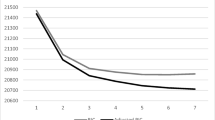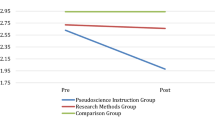Abstract
We examine the relationship between high school students' beliefs about the nature of knowledge, or epistemological beliefs, and their attitudes toward education. High school students completed an epistemological questionnaire assessing their beliefs in fixed ability to learn, simple knowledge, quick learning, and certain knowledge. Then they answered open-ended questions on a hypothetical character named Billy. They were to advise Billy if he should go on to college even though his grades were poor and his parents had no money. Finally, they completed questions about their own feelings toward high school and their expectations of the demands of college. Attitudes toward school were then regressed on epistemological belief factor scores. The less students believed in fixed ability to learn and quick learning, the more likely they were to encourage Billy to go to college and to appreciate the role of school in furthering their education, gaining employment, and living everyday life.
Similar content being viewed by others
REFERENCES
Anderson, H. L., and Young, V. M. (1992). Holistic attitudes of high school students toward themselves and their school experiences. Adolescence 27: 719–729.
Baxter Magolda, M. B. (1992). Students' epistemologies and academic experiences: Implications for pedagogy. Review of Higher Education 15: 265–287.
Boyes, M. C., and Chandler, M. (1992). Cognitive development, epistemic doubt, and identity formation in adolescence. Journal of Youth and Adolescence 21: 277–304.
Chandler, M., Boyes, M., and Ball, L. (1990). Relativism and stations of epistemic doubt. Journal of Experimental Child Psychology 50: 370–395.
Dreher, M. J., and Singer, H. (1985). Predicting college success: Learning from text, background knowledge, attitude toward school, and the SAT predictors. National Reading Conference Yearbook 34: 362–368.
Dunkle, M. F., Schraw, G. J., and Bendixen, L. (1993). The Relationship Between Epistemological Beliefs, Causal Attributions, and Reflective Judgment. Paper presented at the annual meeting of the American Educational Research Association, Atlanta.
Dweck, C. S., and Leggett, E. L. (1988). A social-cognitive approach to motivation and personality. Psychological Review 95: 256–273.
Glenberg, A. M., and Epstein, W. (1987). Inexpert calibration of comprehension. Memory and Cognition 15: 84–93.
House, J. D. (1995). Noncognitive predictors of achievement in introductory college chemistry. Research in Higher Education 36: 473–490.
Jehng, J. J., Johnson, S. D., and Anderson, R. C. (1993). Schooling and student's epistemological beliefs about learning. Contemporary Educational Psychology 18: 23–35.
Kitchener, K. S. (1986). The reflective judgment model: Characteristics, evidence, and measurement. In R. A. Mines and K. S. Kitchener (eds.), Adult Cognitive Development: Methods and Models. New York: Praeger Publishing, pp. 76–91.
Perry, W. G., Jr. (1968). Patterns of Development in Thought and Values of Students in a Liberal Arts College: A Validation of a Scheme. Cambridge, MA: Bureau of Study Counsel, Harvard University (ERIC Document Reproduction Service No. ED 024315).
Qian, G., and Alvermann, D. (1995). Role of epistemological beliefs and learned help-lessness in secondary school students' learning science concepts from text. Journal of Educational Psychology 87: 282–292.
Ryan, M. P. (1984). Monitoring text comprehension: Individual differences in epistemological standards. Journal of Educational Psychology 76: 248–258.
Schoenfeld, A. H. (1988). When good teaching leads to bad results: The disasters of “well-taught” mathematics courses. Educational Psychologist 23: 145–166.
Schommer, M. (1990). Effects of beliefs about the nature of knowledge on comprehension. Journal of Educational Psychology 82: 498–504.
Schommer, M. (1992) Predictors of Epistemological Beliefs: Comparing Adults with Only a Secondary Education to Adults with Post-Secondary Education. Paper presented at the Midwestern Educational Research Association, Chicago.
Schommer, M. (1993). Epistemological development and academic performance among secondary students. Journal of Educational Psychology 85: 1–6.
Schommer, M., Crouse, A., and Rhodes, N. (1992). Epistemological beliefs and mathematical text comprehension: Believing it's simple doesn't make it so. Journal of Educational Psychology 84: 435–443.
Schommer, M., and Hutter, R. (1995). The Relationship Between Epistemological Beliefs and Controversial Day-to-Day Issues. Paper presented at the annual meeting of the American Educational Research Association, San Francisco.
Spiro, R. J., Coulson, R. L., Feltovich, P. J., and Anderson, D. K. (1988). Cognitive flexibility theory: Advanced knowledge acquisition in ill-structured domains. In V. Patel and G. Groen (eds.), Tenth Annual Conference of the Cognitive Science Society. Hillsdale, NJ: Erlbaum, pp. 375–383.
SPSS, Inc. (1975). SPSS, 2nd ed. (Manual). Chicago, IL: Author.
Walker, L. (1985). Grammar teaching in Alberta, 1905–1985. English Quarterly 18: 24–34.
Author information
Authors and Affiliations
Rights and permissions
About this article
Cite this article
Schommer, M., Walker, K. Epistemological Beliefs and Valuing School: Considerations for College Admissions and Retention. Research in Higher Education 38, 173–186 (1997). https://doi.org/10.1023/A:1024929619223
Issue Date:
DOI: https://doi.org/10.1023/A:1024929619223




